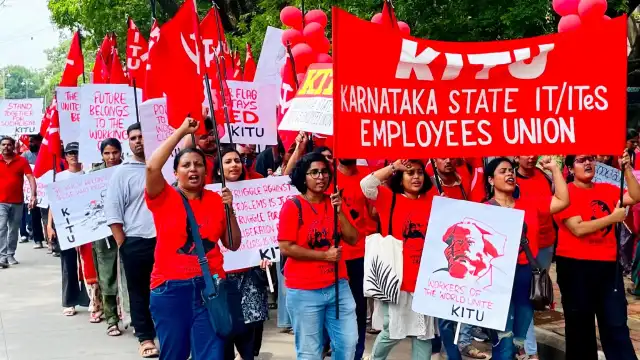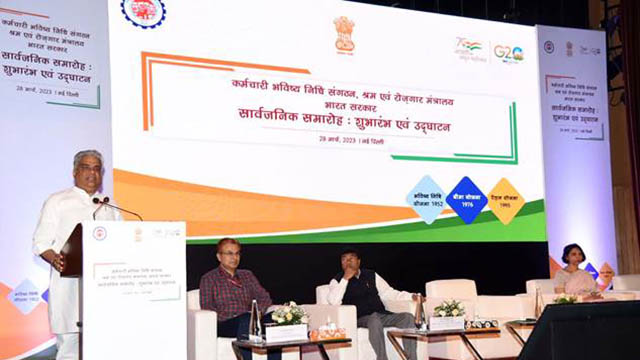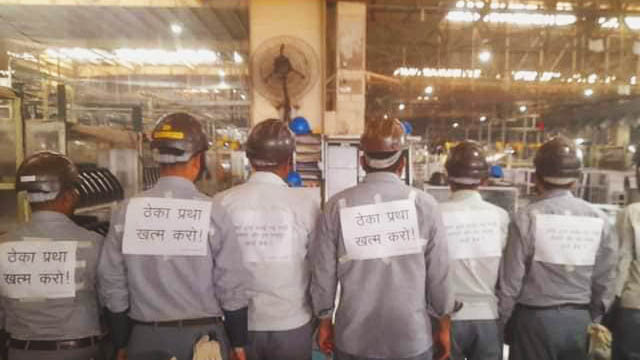India’s Karnataka state is apparently planning to take the state’s technology workforce back to the early 19th century by proposing a prolonged 12-hour workday, which the trade unions have condemned and opposed.
Karnataka’s Labour Secretary NV Prasad called a meeting on Tuesday, June 18th, to discuss a proposal to increase working hours for the information technology (IT), information technology-enabled services (ITES), and business process outsourcing (BPO) industries by amending the Karnataka Shops and Commercial Establishments Act.
The Karnataka State IT/ITeS Employees Union’s (KITU) general secretary Suhas Adiga, president VJK and secretary Lenil Babu attended the meeting along with other stakeholders of the industry.
The KITU strongly opposed Karnataka state government’s proposal for a 12-hour workday proposal, citing the adverse impacts such prolonged hours will have on employees’ wellbeing, the organisation said in a statement.
In its statement against Karnataka government’s proposal for a 12-hour workday, the KITU “calls upon the entire working class to come in resistance against the Karnataka Government”.
According to the KITU, the existing act only allows a maximum of 10 hours of work per day, including overtime.
It alleges that the Karnataka government’s labour law amendment will allow companies to go for a two-shift system instead of the currently existing three-shift system, thanks to the 12-hour workday, and allow them to throw out one-third of the workforce.
During the meeting, KITU pointed out the studies on the health impact of extended working hours among IT employees in the state.
A report on the mental health in the workplace, “State emotional wellbeing report 2024”, has revealed that 90% of corporate employees in India under the age of 25 are struggling with anxiety, the KITU cited during the meeting.
“Deaths and suicides due to excessive work pressure are becoming common in the IT sector,” the union stressed citing the recent suicide of a software engineer at OLA’s Artificial Intelligence (AI) unit in Bengaluru, Karnataka’s capital and one of India’s top technology industry hubs, due to extreme work pressure.
“Increasing working hours will further aggravate this situation. The Karnataka Government, in their hunger to please their corporate bosses, completely neglects the most fundamental right of any individual — the right to live,” the KITU alleged in its statement.
“This amendment shows that the Government of Karnataka is unwilling to recognise workers as human beings who require personal and social lives to survive. Instead, it views them merely as machines to increase the profits of the corporates it serves,” Mr Adiga highlighted.
Ironically, Karnataka is led by the Indian National Congress (INC), India’s principal Opposition party.
The INC has been a vocal critic of Prime Minister Narendra Modi’s far-right Bharatiya Janata Party’s (BJP) government and its labour policies, which dilute Indian workers’ rights.
However, the same INC has been proposing the amendments to Karnataka’s labour laws after coming to power in the state by defeating the BJP.
In 2024, the INC-led Karnataka government had proposed a similar amendment to extend the working hours of IT, ITeS and BPO workers to 14 hours a day.
However, the government had to retreat then facing stiff opposition from trade unions, including the KITU.
“The renewed push to extend working hours reflects the government’s continued efforts to serve corporate interests over workers’ rights,” Mr Adiga said in his statement, citing the 2024 experience.
“This amendment comes at a time when the world is beginning to acknowledge that increased working hours negatively impact productivity, and more countries are introducing legislation to recognise the right to disconnect as a basic right of every employee,” Mr Adiga added.
The KITU urges the government “to reconsider this move and warns that any attempt to proceed with the amendment will be seen as a direct challenge” to the two million employees working in the IT/ITeS sector in Karnataka.
“KITU calls upon all IT/ITeS employees to unite and stand together to resist this inhuman attempt to impose modern-day slavery upon us,” Mr Adiga said in conclusion.
As the KITU has been intensifying its movements against the government-corporate nexus that has been pushing extended work hours to increase profits, it remains to be seen how the INC-led government reacts and what steps it takes to alleviate the union’s concerns.
Join our channels on Telegram and WhatsApp to receive geopolitical updates, videos and more.






